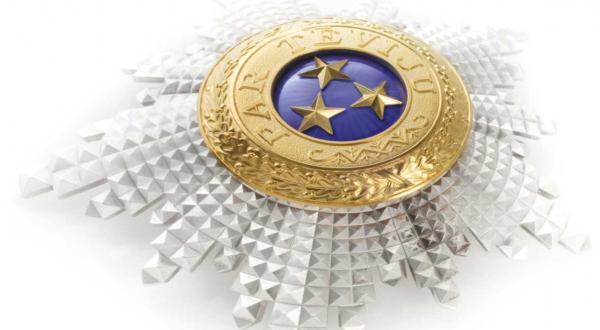Going to Riga for a Degree in Diplomacy, studying International Governance and Diplomacy at RSU
Thanks to its location, history, and experts, Latvia is particularly appealing to anyone interested in foreign affairs, says Louisa Sophie Lönnies, a student in the International Governance and Diplomacy Master's study programme at Rīga Stradiņš University (RSU). Having completed her bachelor studies in Cologne along with several hundred classmates, Louisa takes pleasure in talking about the small group size, how interactive her studies are and the genuinely personal approach of the teaching staff.
Louisa and her classmates from India, Armenia, Georgia, the UK, Cameroon, and Latvia make up the first class of the new International Governance and Diplomacy study programme. First from the left is the Head of program, Māris Andžāns, and Louise is the fourth from the left.
Louisa and her classmates from India, Armenia, Georgia, the UK, Cameroon, and Latvia make up the first class of the new International Governance and Diplomacy study programme. For years, RSU has been among the leading exporters of education in the Baltic States with one in four university students coming from abroad, mostly from Germany, Sweden, Finland, Norway, and Italy. Yet, until now RSU has mostly been known abroad for its medicine and dentistry study programmes. Along with introducing International Governance and Diplomacy, RSU has extended the range of studies available in English, launching its first study programme in social sciences. This direction is constantly evolving with course content already being developed for the Transition and Russia Studies Master's study programme.
A small country’s different perspective
‘Half of my classmates come from Latvia. They have chosen to study in English to be better prepared for an international career. The other half comes from all over the world. They also represent a variety of fields – we have people who have studied philology, history, business, and media management. This all gives a more detailed overview and understanding of the things we study,’ says Louisa. She previously completed her bachelor’s studies in economics in Cologne, during this time she also participated in the Erasmus+ exchange programme in Madrid. Already then, Louisa started to consciously choose interdisciplinary study courses in which economics were intertwined with politics.
Visiting the Saeima of the Republic of Latvia.
Upon weighing her options of where to conduct her master’s studies, it was clear to Louisa that she would study international relations and diplomacy and that she would do it in a country other than Germany. She researched all options and finally found the RSU programme. ‘At that moment, I had to google the exact location of Latvia. I won't even try to hide that I knew very little about Eastern Europe,’ she explains.
Being from the German city Aachen, Louisa is well aware of how living near a border enriches one's understanding of many issues. Aachen is the westernmost city in Germany, located very near the border to Belgium and the Netherlands. This brings added value as it makes one's perspective more comprehensive and broader. ‘In terms of international relations, Latvia is special as it is a small country on the outer border of the EU and neighbours a global power,’ points out Louisa who just recently completed a study course on small countries in the international system. She talks about her lecturers with great enthusiasm as they are experts in foreign affairs with international experience.
Supportive and inspiring lecturers
Louisa is not only fascinated by the content of her studies, but their format as well. Contrary to studies in Germany, she was first surprised to learn that there is no strict hierarchy among lecturers and students in Riga – the relationship between them is closer, which promotes a culture of discussion even if one is a newcomer to a particular field. It also helps that the group is rather small and that lecturers have time to work with each individual student. ‘In Cologne, studies were mostly conducted in lecture format with 200-300 students in the same auditorium. My first conversation with a lecturer took place when I started writing my bachelor's thesis. Meanwhile, here I received a lot of support, help, and consultation as early as the first week of studies – the approach is truly individual!’ she explains. Louisa also appreciates the module system, which means that students master one study course at a time in a very intensive and condensed manner for approximately four weeks. This allows you to focus on a single topic and distribute the amount of work evenly without panicking twice a year during the exam period.

Among the greatest challenges students currently face, Louisa lists the significant number of essays she has to write. To provide a written justification for one's views, you have to read a lot. Louisa has found out that she is most productive in one of the reading rooms of the National Library of Latvia. ‘It is very calm there, and the panorama of the Daugava River and the Riga Old Town is very inspiring,’ says the student.
Louisa's boyfriend also saw Riga as a suitable place to complete his master’s studies, and they both arrived in Latvia at the end of August. He chose to study at the Riga Graduate School of Law, from which he will soon graduate. Louisa is not quite sure about her future plans yet, but she is convinced that a master’s degree in international relations and diplomacy will be a great starting point for her career, because ‘international relations offer plenty of possibilities. I would like my future to be connected to international organisations, preferably in the non-governmental sector. Values motivate me more than the financial aspect. This might sound overly ambitious, but I would like to contribute to making the world a better place.‘




